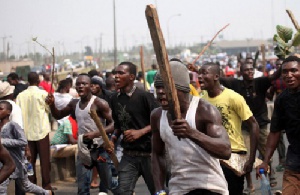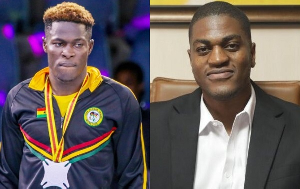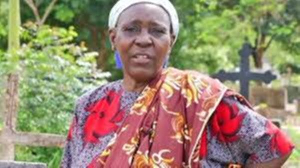Like many of you, I was shocked, sad, and outraged when I watched the video of the lynching of Captain Maxwell Mahama with the 5th Infantry of the Ghana Armed Forces, in broad daylight on Monday, May 29, 2017. May his soul rest in peace with the Lord and may the Lord console and bless his family and friends.
Before addressing the bystander and eyewitness issues, it may be helpful to correct the wrong impression some people have about their right, under the cover of vigilantism or mob actions, to punish or even kill a criminal offender or suspected criminal offender with impunity, particularly if the person is accused of being an armed robber or a witch.
Ghana is a country of laws. The Police, other law enforcement agencies, and the judiciary handle the criminal law process.Therefore, people should not take the law into their own hands and punish or kill others suspected of criminal activities. They should let the law handle them.
Those who would like to kill suspected or actual criminals should note that there are only a few crimes in Ghana which carry the death penalty, and the penalty should only be carried out in accordance with the law. Contrary to popular belief, armed robbery, in itself, does not carry the death penalty, unless a human being is killed during the commission of the crime, in which case, it would be murder.
Armed robbery, without more, carries a penalty of imprisonment for a term of not less than 15 years (Criminal Code, 1960 (Act 29), section 149, as amended by Criminal Code (Amendment) Act, 2003 (Act 646)).
Even if someone actually commits a death penalty crime and is caught, we should let the law handle matters.

Article 13, clause 1, of the 1992 Constitution provides that “no person shall be deprived of his life intentionally except in the exercise of the execution of a sentence of a court in respect of a criminal offence under the laws of Ghana of which he has been convicted.” There is no reason why anyone should take it upon himself or herself to summarily punish or kill another human being in the name of justice. Therefore, all those who think they can kill a thief, a pickpocket, an armed robber, a witch, or even a murderer, except in the case of self-defense, should be aware that they will be committing a heinous crime of murder for which the penalty is death.
As it happened in Captain Mahama’s case, the probability of killing an innocent suspect is just too high in mob actions. That was why Benjamin Franklin, an American-Statesman, expanded Voltaire’s maxim, “that it is better 100 guilty Persons should escape than that one innocent Person should suffer”.
Captain Mahama’s murder made the news and went viral partly because he was an innocent army officer.
However, that was by no means an isolated incident. Many ordinary innocent citizens of Ghana may have been unjustifiably killed by mobs and vigilante groups for various flimsy reasons. These ought to stop! People should allow the Police, other law enforcement agencies, and the judiciary to handle criminal matters.
To the extent reasonable, all of us have a moral obligation to intervene when a crime is being committed in our presence. Depending on the circumstances, some of us may even have a legal obligation to do so. Section 22 of the Criminal Code cited above provides that, “every person who, knowing that a person designs to commit or is committing a felony, fails to use all reasonable means to prevent the commission or completing thereof, is guilty of a misdemeanour.”
There is no need to dwell too much on the legal implications of this section in this paper. Suffice it to say that we should be each other’s keeper and do all we reasonably can to prevent violent crimes against our fellow human beings.
In many cases, mob actions start or continue when law-abiding people stand by and do nothing. Some bystanders and eyewitnesses briefly observe the crime being committed and walk away; others stand by, watch to the end, but do nothing.If you walk away or stand by and do nothing, you are unknowingly providing moral support and encouragement to the perpetrators.

Sometimes, those committing the crime are playing to the crowd and so if you cheer them on or remain silent, it is assumed you are in support, and they would continue with the crime. On the other hand, if you register your strong disapproval, it may discourage the perpetrators and they may stop because they would know that at the very least you and others in the crowd could become eye witnesses for the police.
Sadly, anyone of us could be a victim of lynching if we do not stop the barbaric acts. It could be a simple case of mistaken identity, or a premeditated plot by your enemy who simply shouts “thief” in a crowded place. If you are being lynched, you would wish that others intervene without considering the risk those persons may have to assume.
It is the same mindset that we need to have for others. Intervention can be in many forms. It may include questioning the perpetrators why they are committing the crime; appealing to their conscience and reasoning with them; pleading with them; putting yourself between the perpetrators and the victim; raising an alarm for other well-meaning people to come and help; or calling the police all within reason. In some instances, the intervention could distract attention of the perpetrators and allow the victim to escape.
We should have the mind of Christ, and ask what Christ would do under the same or similar circumstances. Jesus Christ faced a similar situation as recorded in John Chapter 8. The Pharisees brought to Jesus a woman caught in adultery, and asked him what to do with her since the Law of Moses required that she be stoned to death.
Picture the tense situation of the mob with stones firmly in their hands, the adrenaline pumping, and the men all fired up to stone the woman to death.
However, Jesus had a plan to stop the planned mob action. First, he distracted their attention by spending time writing on the ground instead of giving them a quick answer. As long as the crowd was focused on Jesus, no one harmed the woman. Second, Jesus reasoned with them and appealed to their conscience by telling them that the one without sin should cast the first stone. One by one, the crowd dispersed and no one cast a stone.
Let’s learn a lesson from what Jesus did and become constructive bystanders and eyewitnesses. It may mean that we have to suffer for others, just as Christ suffered for us. Let’s resolve to intervene in negative mob actions, as reasonably as possible, and nip them in the bud before they start or stop those that have already started. It usually takes one or two persons to organise a mob, and so one or two persons could also help to stop it. That is where you come in.
Prayer is the key. May God grant us the grace to seek Him daily through our prayers.
Dr. Daniel Gyebi, Attorney-at-Law, Texas, U.S.A., and Founder, PrayerHouse Ministry, Kumasi, Ghana.
Opinions of Friday, 2 June 2017
Columnist: Dr. Daniel Gyebi



















